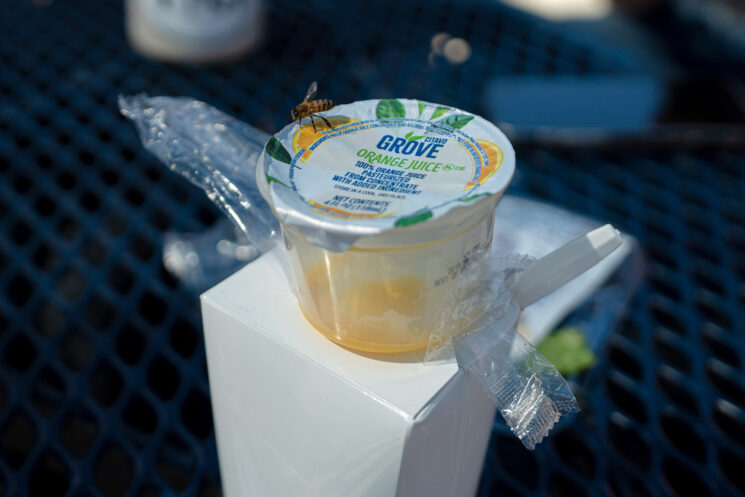
By Christine Garcia
The Fountain Valley High School (FVHS) administration sent out a Titan HST message warning students on campus about clusters of hungry bees storming the area surrounding the school’s cafeteria on Oct. 2 and 3.
On Oct. 2, cafeteria workers served fluffy, warm pancakes with a side of “Smucker’s” syrup as a breakfast item. An abundance of waste in the trash cans and uncleaned lunch tables led to the bees swarming the lunch lines and entryways of the hallways.
Other than alerting students through the Titan HST app, FVHS supervision contacted a district expert. According to the expert at Huntington Beach Union High School District, the bee swarm was the result of sugary substances on the tables that attracted the bees, not a beehive. Typically, according to the Museum of the Earth, female worker bees leave their nest to scavenge for nectar and pollen, hovering in a looping pattern.
Students like sophomore Perlina Trieu remember the Titan HST email regarding the bees but felt that the message had not gone into detail about the severity of the issue.
“[The Titan HST message] still didn’t prepare me enough for the sheer amount [of bees]. Usually, you don’t see more than two bees at a time on campus, but there were at least seven at a time that day,” Trieu said.
The bees’ behavior is out of the staff’s control; however, faculty and staff have tried their best to mitigate the bee swarms by maintenance staff working diligently to reduce waste on campus.
“If it’s [bees] in areas like in a classroom or something like that, obviously we would take action, moving kids out of the area because [FVHS students’] safety is our priority,” Assistant Principal of Activities and Athletics Hayato Yuuki said.
Mobs of bees are particularly new on campus, and FVHS staff’s main concern was that the swarm of bees presented a threat to students who have bee allergies. Yuuki expressed the importance of prioritizing students’ health, and he wanted the Titan message to warn students not only of the bees but also to precaution those with allergies.
However, the bees were not only dangerous to students who have bee allergies on campus; they also disrupted student life. Sophomore Alaisha Martone recalls an event in her English class last week where bees had flown into the classroom.
“I was scared when the bees started coming into the classroom,” Martone said. “I don’t like bees [since] I’ve been stung by one before and generally try to avoid them.”
Sophomore Haylee Pham and her friends had to relocate their designated lunch spot due to the bees surrounding the area where they usually ate.
“They’ve been around since last year, and it’s getting worse this year,” Pham said. “It’s getting annoying now, and it’s harder to eat lunch when they’re around.”
Last week, FVHS’s registered nurse, Marci McLean-Crawford, cared for multiple students who were stung by bees.
She recommended removing the stinger and disinfecting the affected area with water and soap. If you experience inflammation surrounding the area, use ice. Afterward, monitor your symptoms for serious issues that may arise, such as trouble breathing, itchy throat or a rash.
If you have been stung by a bee, visit the nurse’s office to receive care.
As for the pancakes and syrup, Yuuki and the cafeteria staff are still discussing plans on whether they will continue to serve the dish.
“We don’t have a plan,” Yuuki said. “But that’s something that we’re working [on] right now.”
Bee swarms are inevitable, but staff have prioritized students’ health on campus by taking quick action: alerting students through a Titan HST message immediately, calling an expert to address the issue and observing student interaction with bees.





